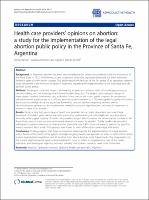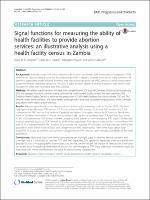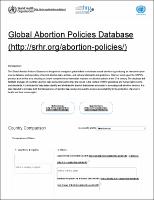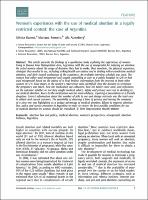Mostrar el registro sencillo del ítem
Health care providers' opinions on abortion: a study for the implementation of the legal abortion public policy in the Province of Santa Fe, Argentina
| dc.contributor.author | Ramos, Silvina | |
| dc.contributor.author | Romero, Mariana | |
| dc.contributor.author | Ramón Michel, Agustina | |
| dc.date.accessioned | 2014-10-17T01:21:09Z | |
| dc.date.available | 2014-10-17T01:21:09Z | |
| dc.date.issued | 2014 | |
| dc.identifier.citation | Ramos S, Romero M, Ramón Michel A. Health care providers’ opinions on abortion: a study for the implementation of the legal abortion public policy in the Province of Santa Fe, Argentina. Reprod Health. 2014; 11(1): 72 | es_ES |
| dc.identifier.issn | 1742-4755 | |
| dc.identifier.uri | http://clacaidigital.info/handle/123456789/629 | |
| dc.description.abstract | Background: In Argentina, abortion has been decriminalized under certain circumstances since the enactment of the Penal Code in 1922. Nevertheless, access to abortion under this regulatory framework has been extremely limited in spite of some recent changes. This article reports the findings of the first phase of an operations research study conducted in the Province of Santa Fe, Argentina, regarding the implementation of the local legal and safe abortion access policy. Methods: The project combined research and training to generate a virtuous circle of knowledge production, decision-making, and the fostering of an informed healthcare policy. The project used a pre-post design of three phases: baseline, intervention, and evaluation. It was conducted in two public hospitals. An anonymous self-administered questionnaire (n = 157) and semi-structured interviews (n = 27) were applied to gather information about tacit knowledge about the regulatory framework; personal opinions regarding abortion and its decriminalization; opinions on the requirements needed to carry out legal abortions; and service’s responses to women in need of an abortion. Results: Firstly, a fairly high percentage of health care providers lack accurate information on current legal framework. This deficit goes side by side with a restrictive understanding of both health and rape indications. Secondly, while a great majority of health care providers support abortion under the circumstances consider in the Penal Code, most of them are reluctant towards unrestricted access to abortion. Thirdly, health care providers’ willingness to perform abortions is noticeably low given that only half of them are ready to perform an abortion when a woman’s life is at risk. Willingness is even lower for each of the other current legal indications. Conclusions: Findings suggest that there are important challenges for the implementation of a legal abortion policy. Results of the study call for specific strategies targeting health care providers in order to better inform about current legal abortion regulations and to sensitize them about abortion social determinants. The interpretation of the current legal framework needs to be broadened in order to reflect a comprehensive view of the health indication, and stereotypes regarding women’s sexuality and abortion decisions need to be dismantled. | es_ES |
| dc.description.uri | http://www.reproductive-health-journal.com/content/11/1/72 | es_ES |
| dc.description.uri | http://www.ncbi.nlm.nih.gov/pmc/articles/PMC4197265/ | es_ES |
| dc.language.iso | en_US | es_ES |
| dc.relation.ispartofseries | Reprod Health.;2014 Sep 24;11(1):72 | |
| dc.subject | Argentina | es_ES |
| dc.subject | Aborto legal | es_ES |
| dc.subject | Personal de salud | es_ES |
| dc.subject | Testimonio de Experto | es_ES |
| dc.title | Health care providers' opinions on abortion: a study for the implementation of the legal abortion public policy in the Province of Santa Fe, Argentina | es_ES |
| dc.type | Article | es_ES |
Ficheros en el ítem
Este ítem aparece en la(s) siguiente(s) colección(ones)
-
CEDES [52]
Centro de Estudios de Estado y Sociedad -
Artículos académicos [299]
-
2. América Latina y el Caribe [894]
-
Argentina [338]
-
Implementación [125]



